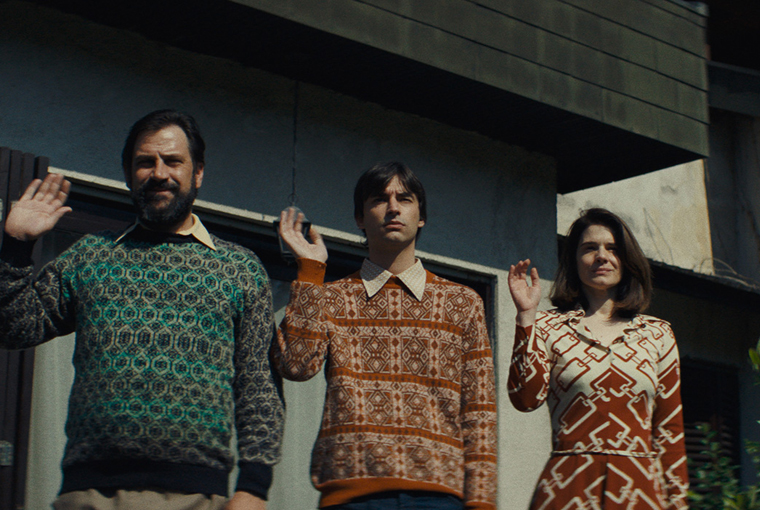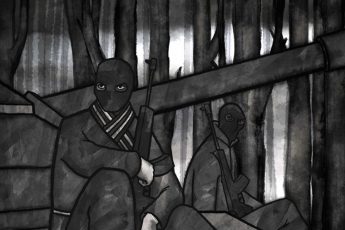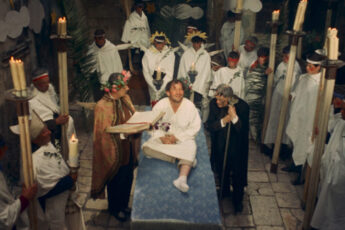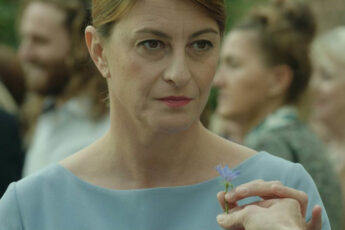It’s Christmas and Time’s Up!
David Kapac and Andrija Mardešić’s The Uncle (Stric, 2022)
Vol. 128 (October 2022) by Colette de Castro
Brightly patterned knitwear, synchronized waving and twanging electronic music. It’s beginning to look a lot like Christmas in 1980s Yugoslavia. But wait, is that an iPhone ringing at the dinner table? And wouldn’t it be pretty cold and dark on an evening at that time of year? – David Kapac and Andrija Mardešić’s The Uncle is one of those films that’s fun to watch because you can pick up things that are a bit off, and in the mad-cap dash that is The Uncle’s 1h 44 minutes, there is certainly a lot to pick up on.
The film begins with three people making preparations for Christmas dinner. Their relationships are unclear for the moment, but we soon realize that they are a family: mother, father, and grown-up son. They are preparing for the arrival of an uncle, played by Miki Manojlović, who was in many of Emir Kusturica’s films, including Underground (1995) and Black Cat, White Cat (1998). The uncle has driven all the way from Germany to celebrate this holiday with his beloved family. Cue the synchronized waving on the doorstep as the uncle drives up in his expensive car; cue the strained conversations and questions on the doorstep. The atmosphere is tense, but is it really so different from other families celebrating Christmas together? As the uncle fondles his nephew’s balls while asking how much hair has grown on them this year – “a whole forest, uncle” -, we start to see that it is quite different indeed.
Co-directors David Kapac and Andrija Mardešić have perhaps bitten off more than they can chew in this bonkers debut feature. As it turns out, the reason it is not cold outside is that Christmas does not come but once a year. Nor is Christmas really Christmas, for the whole celebrations turn out to be a stunt both initiated and orchestrated by the tyrannical uncle. Although the result is brilliantly creepy, it’s lacking both the gumption and the technical skills to be on the level of the two films it is most often compared to: Michael Haneke’s Funny Games and Yorgos Lanthimos’ Dogtooth.
The “play” that is Christmas in this household is introduced to us from their first Christmas meal: there are the rites of eating and drinking, then present-giving and home-video watching, and finally dancing. The lines they say sound robotic, but we realize there’s a good reason for this when the uncle leaves and the mother suggests to her son that they get started on preparations for the next Christmas evening, which will happen “in three days time”. Ivana Roščić, who plays the mother, is a great actress, and there’s urgency and passion to her character. In comparison, father and son don’t seem to quite know what they’re doing or why they are there: their motives are truant. This lack of drive gives them a slightly “blurry” quality, and it’s difficult to empathize with them, even in their sad, imprisoned state. After the situation is made manifest, we’re left with a lot of questions: how long has this been going on for? Why is the uncle doing this? The vague hints at political motivations are unfortunately never developed, leaving us with more questions than answers.
Although the whole film takes place in the confines of the house and garden, we never get much information about the family members’ relationship with each other. When the overbearing uncle is not present, they’re too busy preparing for the next Christmas to let us know what’s going on. But it seems that this kind of film works best when we’re rooting for the characters, or they at least have a goal. Here, the blurry quality of the family members leaves us wanting. One gets the feeling that the real action of the film is happening elsewhere: either in the past, or off in the car somewhere with the perverse uncle. When he leaves, we’re frustrated to be left behind with the joyless trio.
In Lanthimos’ Dogtooth, two teenagers are imprisoned and hardly allowed to leave the house by their mad parents. The characters’ motivations are very clear: the parents want to protect their children from outside corruption, and the children want to grow up and escape their parents’ prison. The wonderful thing about the film is the way it uses world-building in a confined universe to create humor in a harrowing situation. Because of this desire to protect their children, the parents give new meanings to common words like war and sex, which describe things that are considered unpleasant or dangerous. In its best moments, The Uncle also uses language to single out the troubling aspects of the situation, for example by creating artificial in-fighting between the son and his parents – but it’s almost always a step too short to turn it into humor.
Because the whole Christmas celebration is a kind of play, we come to associate certain images with dialogues from a Christmas “script”. The disturbing view of a pile of undercooked, rotting turkeys is linked to chit-chat about missing relatives, the bashed-about Christmas tree to a compliment given by the uncle to the mother about her figure, the record player to the uncle’s favorite song. It’s a little like the party game “Time’s Up”, in which you become so familiar with the words you are guessing that by the third round you just make a gesture to convey a word. A Lanthimos or a Haneke might have used this richness to their advantage, perhaps by making a game out of this word and image association, but the co-directors of The Uncle don’t seem to have thought quite that far ahead. The words they use are cleverly written and thought-out – Kapac and Mardešić are both scriptwriters first and foremost – and the cinematography is nicely crafted. The elements of sound and image which the viewer uses to make their own dreamscape, whether it be horror or humor, were all happily present. They would have just been so much more powerful if made to work together.




Leave a Comment